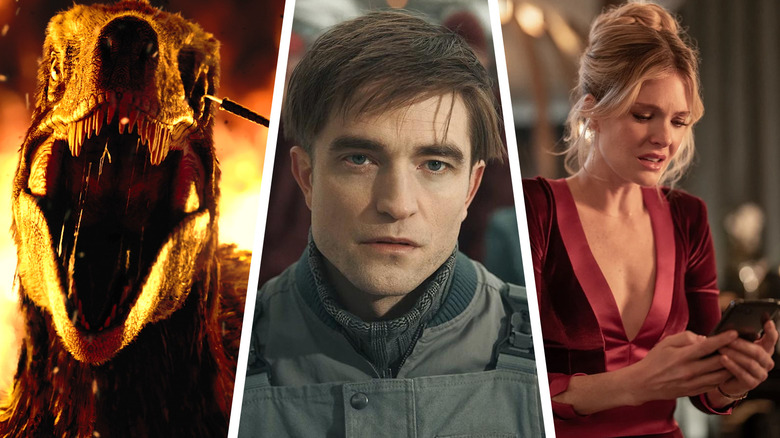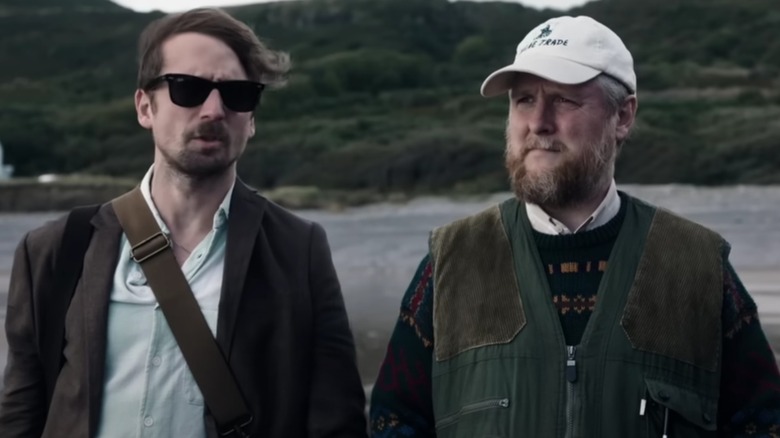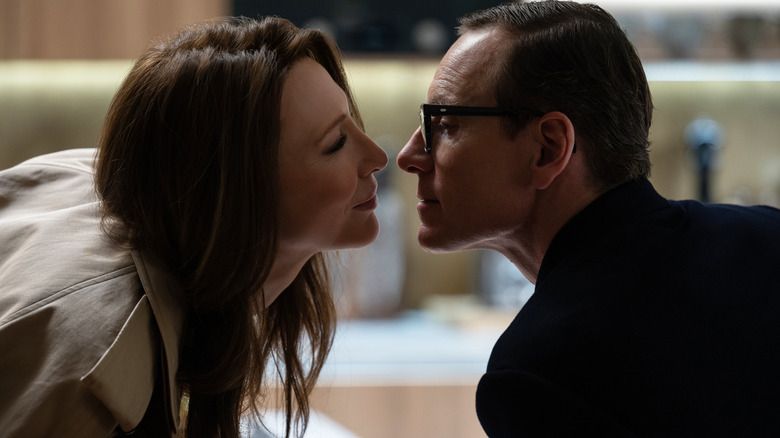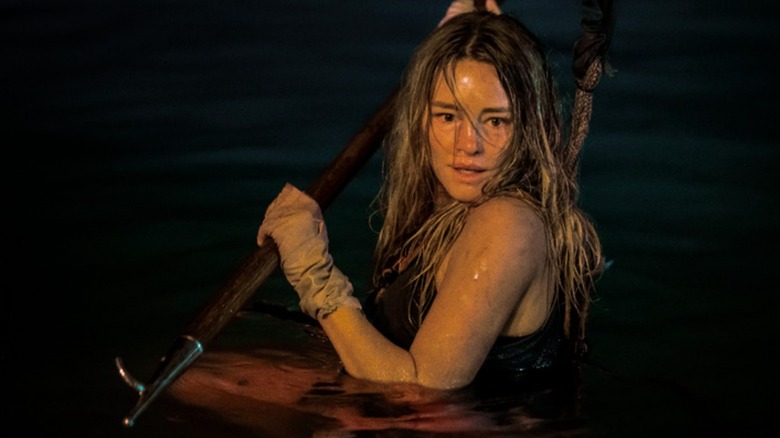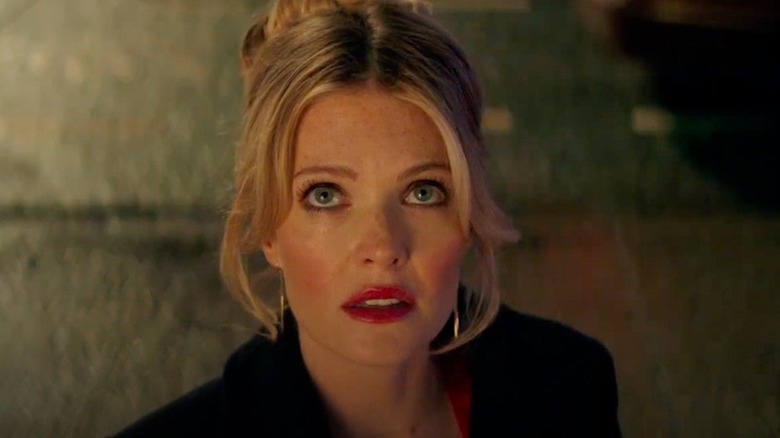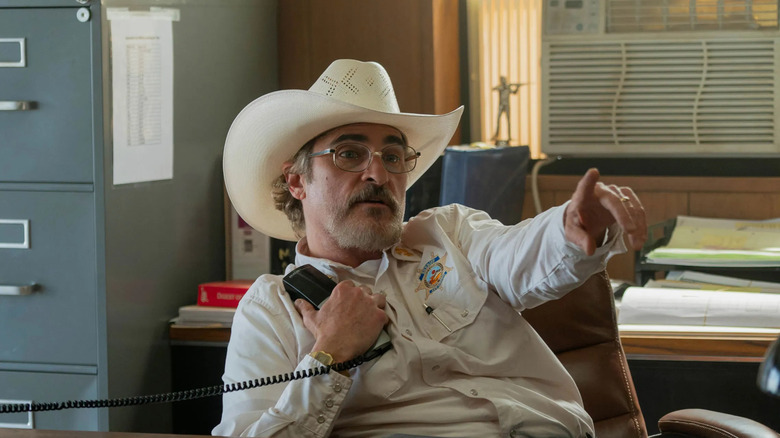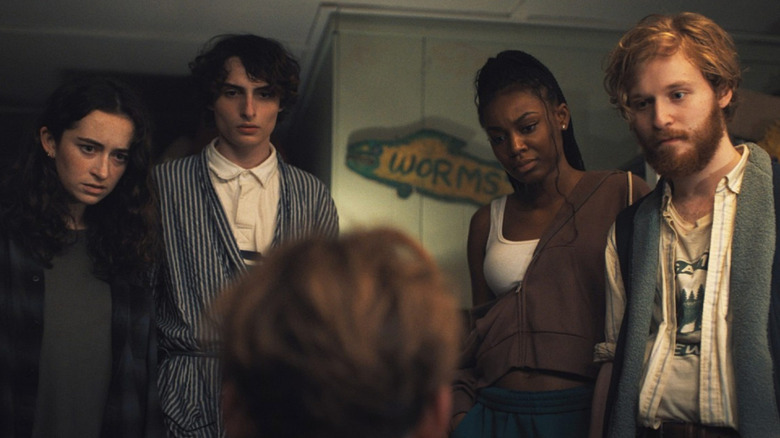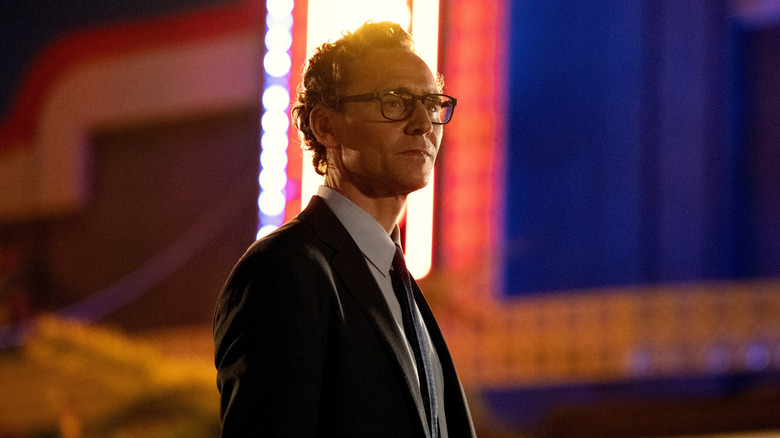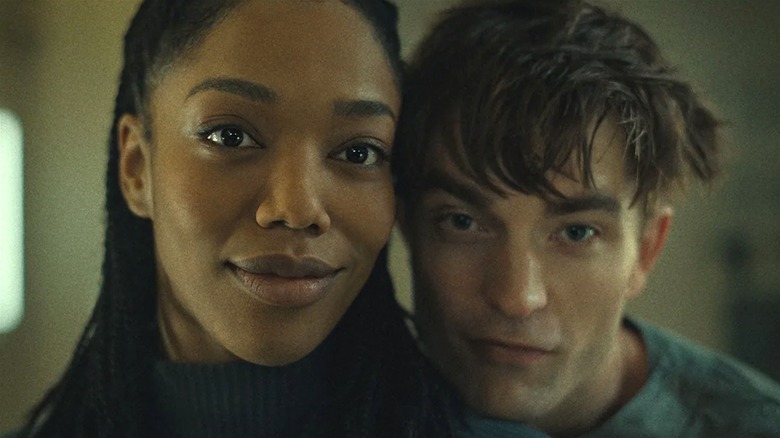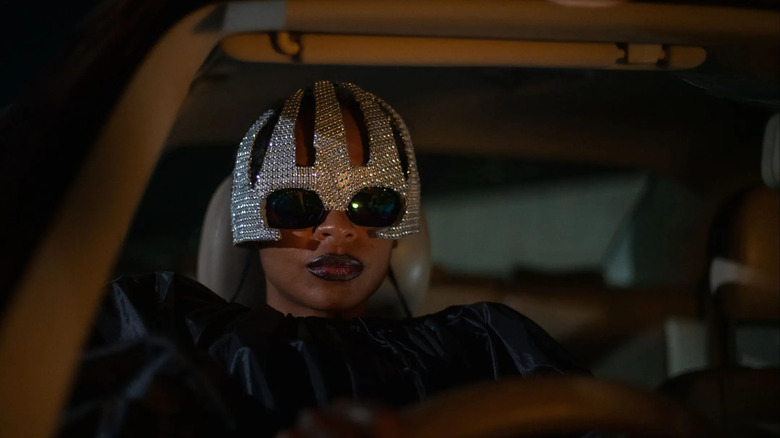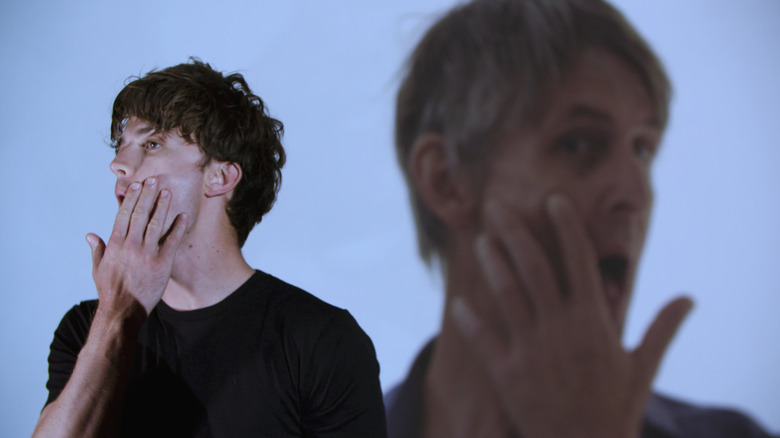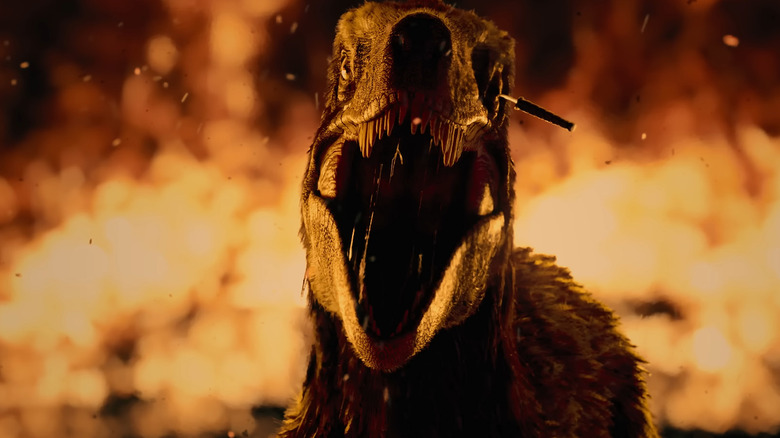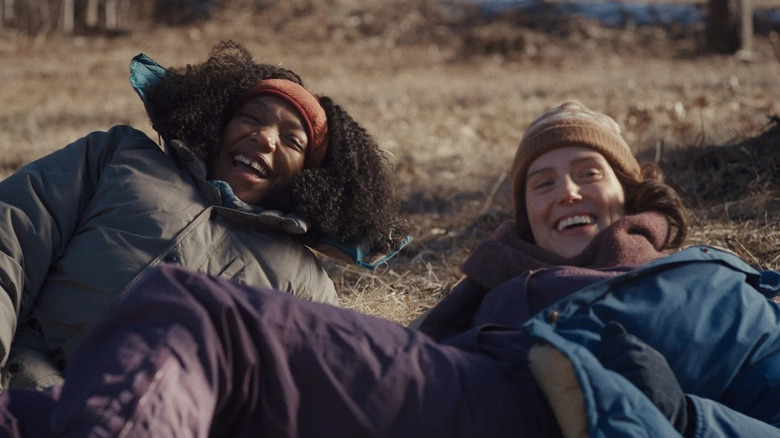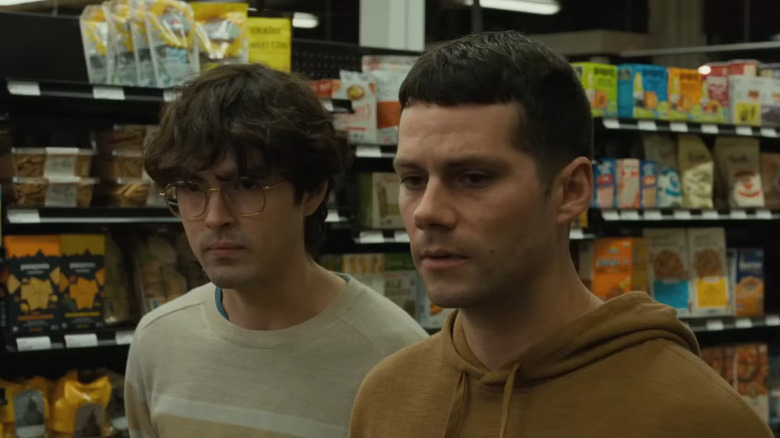15 Most Underrated Movies Of 2025 (So Far)
When we talk about underrated movies these days, it's important to add a caveat: we're not being literal. In other words, a film can have a high score on Rotten Tomatoes and still be considered "underrated" simply because it slipped through the cracks in terms of public consciousness. And sadly, these days, a lot of great movies slip through the cracks as feature films have to contend with the rise of streaming. With that in mind, we've rounded up a bunch of films from 2025 that feel like they deserved more attention. These titles may not have become cultural events that had everyone talking, but we think time will be kind to them.
The Ballad of Wallis Island
If you're in the market for what just might be the greatest little comedy-drama of the year, it's high time to put director James Griffiths' "The Ballad of Wallis Island" on your map. Not that Wallis Island itself features too prominently on any map — it's a timeless, remote, and rural island near the coast of Wales, where famous but struggling folk-turned-pop musician Herb McGwyer (Tom Basden) arrives for a private concert arranged by a rich fan called Charles (Tim Key, who wrote the movie with Basden). The problem is, Charles has also invited Herb's former musical partner-slash-ex Nell (Carey Mulligan) and his new husband (Akemnji Ndifornyen) on Wallis in the hopes of reuniting Nell and Herb's old duo.
"The Ballad of Wallis Island" has no shortage of funny moments, but the characters also harbor great sadness that stems from personal loss and unfulfillment. Fortunately, there are ways to replenish their half-empty cups, and the key to a happier future lies in the unlikely connections they forge with each other. At its core, that's what "The Ballad of Wallis Island" is: It specializes in filling empty hearts with happiness, and is perfectly happy to offer the viewer a few drops of warmth, as well. (Pauli Poisuo)
Black Bag
Leave it to Steven Soderbergh to deliver what's best described as "Who's Afraid of Virginia Woolf?" by way of John le Carré, anchored by the two hottest actors who've shared the screen in 2025. "Black Bag" stars Michael Fassbender as a British intelligence officer assigned to investigate a list of potential traitors — one of whom happens to be his wife, played by Cate Blanchett. This is a smart, sexy thriller where battles are fought over witty dialogue, with Fassbender and Blanchett's performances feeling like a tango of sexual tension, a meticulous and intricate dance that sends sparks through the screen.
David Koepp's script shines brightest when it focuses on the relationship between the two spies, and how the compromises they've made to create their ideal work-life relationship balance threatens to destroy everyone around them. Indeed, this movie argues that any spy thriller would be better if the spy was married, with the relationship drama that comes with the secrecy — especially when both partners are married — making for some thrilling character work. Soderbergh manages to find the perfect combination of middle-age relationship drama and spy theatrics, with a story filled with twists and turns and also one incredible use of a former Bond actor. (Rafael Motamayor)
Dangerous Animals
Sharks and serial killers, two dangers you're much more likely to encounter in movies than in reality. "Dangerous Animals" throws them together; it's a movie about a serial killer whose murder weapon is sharks.
Distributed by IFC and horror-focused company Shudder, "Dangerous Animals" had a brief theatrical run. Since it was a brief window, the movie might have slipped beneath the waves of your attention. Luckily, you've now got plenty of time to fix that.
Set in Australia, "Dangerous Animals" follows surfing nomad Zephyr (Hassie Harrison) who is abducted by sinister boat captain Tucker (Jai Courtney). Tucker kidnaps women, lures sharks near his boat with blood, then lowers his victims into the water to be the fish's dinner, filming the whole thing for his viewing pleasure. One of the earliest serial killer films was 1960's "Peeping Tom," about a man who filmed people as they died. "Dangerous Animals" is "Peeping Tom" by way of "Jaws."
Speaking of "underrated," that's just the kind of actor Jai Courtney is proving himself to be. Hollywood briefly tried to make him a bland action star with square jawed hero parts that didn't play to his strengths (see "Terminator: Genisys"). "Dangerous Animals" puts him in exactly the right role as a jovial Aussie scumbag. Tucker loves his work and as fun as he is to watch, you're also terrified for Zephyr every second she's in his clutches. A good slasher needs both a strong final girl and villain; "Dangerous Animals" delivers both. (Devin Meenan)
Drop
Christopher Landon, a gifted, prolific genre stylist who's big with horror fans but deserves plaudits from mainstream critics, upped his game this year and delivered the best Hitchcockian thriller since Wes Craven's "Red Eye." Though the film was a little light in the star department (lead Meghann Fahy did receive a Primetime Emmy nomination for Outstanding Supporting Actress in season 2 of "The White Lotus"), it still managed to turn a small profit as it tried to find footing in a crowded marketplace dominated by "A Minecraft Movie."
I think "Drop" ran into trouble by being sold on a collapsing high-rise restaurant set piece at the same time New Line was getting insane marketing traction on "Final Destination: Bloodlines" with a similar catastrophic gag. But "Drop" isn't a disaster movie. It's a cat-and-mouse thriller supercharged by a widowed protagonist who's taken the perilous leap to try dating again, and she's rewarded with AirDropped threats by someone who has taken her son and sister hostage. If she doesn't do what they say, it's curtains for both of them. The film was so underseen that I don't want to give away the twists, but Landon confidently irons out the implausibilities of Jillian Jacobs and Chris Roach's screenplay to keep us bought in. It's really more of a Brian De Palma movie (which I'd also say of "Red Eye"); you come for the pure cinema and shrug off the preposterousness. Landon is a great filmmaker, and is loading up to make something special. Perhaps. Or he'll just keep making programmers, in which, Don Siegel would tell you, there is honor. (Jeremy Smith)
Eddington
Writer/director Ari Aster's "Eddington" is designed to be unpleasant, mean, and leave you feeling like every problem plaguing modern American life has just spit in your face and pushed you down a rocky hill and into a pit of cacti. It's one of the least-fun movies released in 2025. It's also one that captures the the sheer baffling terror of being alive right now.
Joaquin Phoenix, at his gonzo best, plays the increasingly erratic sheriff of a small New Mexico town torn asunder by the COVID-19 pandemic, right wing conspiracy theories, and the long arm of big tech. Aster uses horror movie language to send the audience spiraling into an unpleasant descent alongside the film's lead, bringing the rotten culture of the modern internet kicking and screaming in the real world and asking us to examine how we can find any of this acceptable. "Eddington" is a violent horror Western about how social media has turned our brains into microwaved milk. It doesn't care about nuance — like a TikTok doom scroll, it's here to pummel you.
"Eddington" was a box office bomb. It was also critically divisive, earning raves alongside pans that dragged it with utter ferocity. Any movie that can divide audiences like that is one that deserves a lingering look of some kind. Any movie that makes people dig in their heels in either direction is one that every movie fan should seek out and see, just so they can be a part of the conversation. We're going to be talking about "Eddington" for years, and it's going to be required for every movie fan to have something to say about it. Join now, while the ongoing debate is still fresh. (Jacob Hall)
Hell of a Summer
Finn Wolfhard rose to fame thanks to "Stranger Things," Netflix's horror series that is also a massive love letter to the 1980s. With that in mind, it is quite fitting that his directorial debut (which he co-helmed and co-wrote with Billy Bryk) pays homage to a spooky subgenre that rose to prominence in the '80s — the slasher. That said, while some elements of the film are reminiscent of the summer camp-themed horror flicks from that era — "Friday the 13th," "Sleepaway Camp," etc. — "Hell of a Summer" is a charming slasher made by and for Gen Z.
If you go into "Hell of a Summer" expecting a gory movie, you might be disappointed. It's more of a hangout comedy that pokes fun at the aforementioned generation, using deadpan humor to rip on everything from social media to other contemporary trends. The protagonist, Jason (Fred Hechinger), also adds a lovable slacker element to the proceedings, as he only works at the summer camp to avoid adulthood, despite having to co-exist with teenagers he no longer relates to. Jason's presence also leads to some entertaining intergenerational arguments, as his younger colleagues question his life decisions.
There are elements of "Hell of a Summer" that aim to poke fun at the modern youth, but not at the expense of making its characters unlikable. As obnoxious as some of these teenagers are, they are also quite endearing and entertaining. Sure, it'd be great if their deaths were grislier, but a slasher movie with characters who are fun to spend time with is just as good as a bloodbath (Kieran Fisher).
Honey, Don't!
"Honey, Don't!" isn't getting a fair shake. It's a silly, sexy noir centered on Honey O'Donnaughey (Margaret Qualley), a gumshoe PI navigating modern chaos in central California. When a would-be client dies mysteriously, Honey begins to eye a charismatic reverend (Chris Evans) with suspicion. Around her, a web of side plots unfolds: a gay man (Billy Eichner) sniffing out infidelity, her niece (Talia Ryder) trapped in a violent relationship, and a slow-burn romance with a cop named M.G. (Aubrey Plaza), who radiates with chaotic lust from her first scene. Plaza delivers sexual desperation like it's her superpower, as she is known to do.
Comparing the Ethan Coen/Tricia Cooke era of filmmaking (which includes "Drive-Away Dolls") to the work of The Coen Brothers is lazy, because these films are doing something completely different. The comedy's still sharp, it's just wearing a new shade of lipstick. And even if story threads don't always tie off neatly, the pulpy world they've created is rich enough not to care. The film is funny, sexy, and full of promise, and not unlike the femme fatale trope it's clearly inspired by, it shifts cold, complicated, and a little cruel. May we all grow into our weirdest, boldest selves and find a way to make horny, violent throwbacks with the people we love, haters be damned. (BJ Colangelo)
The Life of Chuck
Stephen King is known primarily as a master of horror. Perhaps the master of horror. Mike Flanagan, of "The Haunting of Hill House" and "Hush" fame, has also asserted himself as a modern master of the genre. These two have collaborated in the past on movies like "Gerald's Game" and "Doctor Sleep." So imagine the world's surprise when their third cinematic collaboration, "The Life of Chuck," turned into a heartwarming, tear-jerking, beautiful meditation on the beauty of life and what it means to be alive.
The film is told in three separate chapters, linked together to tell the biography of one Mr. Charles Krantz (Tom Hiddleston). There are apocalyptic, sci-fi, and supernatural elements at play, but what Flanagan has done is take King's novella and turn it into an unflinchingly touching celebration of life. Full of tremendous performances, even from those who only appear on screen briefly, including an incredible turn from "Star Wars" icon Mark Hamill. It feels quite unlike any Stephen King adaptation before it. I can only speak for myself, but I walked out of the movie with a renewed sense of spirit, believing this to be one of my new favorite movies of all time. Yes, it's that good.
Flanagan is known for horror but at the end of the day, he's really a master storyteller getting at the heart of the human experience. "The Life of Chuck" is the most wonderfully human thing he's made to date. It's also one of the best Stephen King adaptations ever. So many movies are about badness and ugliness — how humanity is an ugly thing. This is an unabashed love letter to the individual human experience. We contain multitudes. (Ryan Scott).
Mickey 17
"Mickey 17," Bong Joon Ho's third English-language film (alongside the brilliant "Snowpiercer" and "Okja"), didn't make waves as expected. You could blame it on a repeatedly-postponed release schedule, ineffective marketing for an ambitious genre-hybrid, or a scant interest in an off-kilter non-franchise offering by theater-going audiences. The film's overlooked status, however, doesn't mean that it isn't chock-full of Bong's signature themes, as "Mickey 17" is a scathing anti-capitalist critique funneled through the lens of quirky satire and outlandish farce. The absurd grimness of Mickey's (Robert Pattinson) predicament as a human guinea pig is undercut by something heartbreakingly sincere: unconditional love once Nasha (Naomi Ackie) waltzes into Mickey's fragmented life.
There's a lot to love here. Robert Pattinson playing rival doppelgangers with fun, distinct personalities? Check. Over-the-top antics of cartoonishly evil capitalists, where Mark Ruffalo and Toni Collette get to ham it up? Check. Strange alien critters that might be less harmful than humans who exploit others and deem everyone expendable? Also check. Bong takes us on a beautiful, bizarre journey while effortlessly switching genres, turning "Mickey 17" into a manifesto for tenderness in the face of a cold, brash world that encourages us to abandon empathy. It is a love story (mixed in with elements of a sci-fi thriller and creature feature) that takes wild, wild swings, but most of these bold strokes pay off by the time we relish the conclusion of this odd little sci-fi flick. (Debopriyaa Dutta)
On Becoming a Guinea Fowl
At the beginning of Rungano Nyoni's absurdly dark drama "On Becoming a Guinea Fowl," Shula (Susan Chardy) is driving home from a costume party (she's dressed as Missy Elliott) when she comes upon a corpse lying in the street. She instantly recognizes him as her uncle Fred, but seems unmoved that he's dead. She begins calling people to announce his death, still not the least bit saddened. The rest of the film involves the complex funeral arrangement for uncle Fred, and who might be entitled to his property. Moreso, the film very gradually begins to reveal exactly who Fred was, and what horrendous crimes he committed in life. We see that Shula's family is perhaps going through some dully proprietary motions, play-acting godly rituals, when really they are perpetuating a horrid continuing web of hatred against women, and the deeply sexist Zambian social strata that keep horrible men in "honorable" spaces.
"On Becoming a Guinea Fowl" feels like a Luis Buñuel film, equal parts surreal, comedic, and acidic. It's a satire of sexist systems, and an accusation against the women who, for mere tradition's sake, keep those systems in place. The women in Shula's family, even her mother (Doris Naulapwa) know all about the sexual crimes that uncle Fred committed, but are so concerned about their status and their class that they refuse to say or do anything about it. Many of the women in this movie have been harmed by Fred (or by other men), and they are too stymied by "politeness" to speak out against it. This is a stirring, uncomfortable, and bleakly funny film, and one of the best of the year. (Witney Seibold)
Pavements
Alex Ross Perry's experimental mockumentary, "Pavements," is just as intriguing and offbeat as the band at the center. Combining traditional documentary elements centered on the band's story and a musical mise-en-scene composed of songs from their discography, "Pavements" is the perfect encapsulation of the '90s slacker rockers that refused to be pinned down by the mainstream. Rather than following a traditional arc or relying heavily on a familiar soundtrack-as-narrative device, the film dances around convention. The "story" is that the indie-rock band Pavement is reuniting for a sold-out 2022 tour, but is met with surreal tributes to their work like an off-Broadway musical adaptation of their songs, a museum devoted to their legacy, and a shameless Oscar-bait Hollywood biopic. Did any of this actually happen? Does it even matter?
Instead of rejecting biopic or jukebox musical cliches entirely, "Pavements" instead repurposes, subverts, and warps them into something completely new — not unlike the way a copy machine would to the photography featured on the cover of a zine. The film's irony is purposeful and precise, blending fact with fiction to always keep the audience on their toes. A band like Pavement cannot be contained by traditional means of filmmaking, and only the guy who gave us "Her Smell" and the twisted "Kidprint" segment of "V/H/S/Halloween" could make it happen. (BJ Colangelo)
Primitive War
In the realm of dinosaur cinema, if there is such a thing, it's pretty much "Jurassic Park"/"Jurassic World" and everything else. Oftentimes, that everything else is low-budget schlock. It's been that way for decades. Director Luke Sparke set out to help change that with his wildly ambitious, totally unhinted, delightfully overstuffed "Primitive War." One part monster movie, one part war epic, all awesome, this is the biggest "you need to see it to believe it" action movie of 2025.
The movie takes place at the height of the Vietnam War centering on a recon unit sent to an isolated jungle to uncover the fate of a missing platoon. They soon discover they are not alone because there be dinosaurs in them there jungles. The movie wastes no time getting to the point and once Sparke arrives there, showing lots (and lots) of dinosaurs tearing apart soldiers in the '60s during wartime, it never lets up for most of its runtime (which is well over two hours I might add).
Not that audiences should have to care, but what Sparke accomplished with "Primitive War" on a shoestring budget is remarkable. He crammed in more action, more dinosaurs, and more bonkers set pieces with a fraction of the money that the average Hollywood blockbuster costs, while doubling down on sheer, popcorn entertainment value. Are the actors going to earn any Oscars? Certainly not, but by the time we arrive at the movie's straight-up, gleefully deranged climax, none of that matters. This is everything "Jurassic World" can never be. (Ryan Scott).
Relay
I'm unsure how David Mackenzie's captivating and surprisingly intelligent conspiracy thriller, "Relay," slipped through the cracks, but I'm here to right that wrong. Some of Riz Ahmed's films get that fate, even if they're as brilliant and inventive as "Mogul Mowgli" or, well, "Relay." In the latter, he plays a mysterious and competent fixer who helps whistleblowers conduct a deal with companies they initially wanted to expose, but got intimidated and scared enough to change their minds. Ahmed's Ash is the anonymous intermediary between them, hired to make sure they get their money and stay alive. To keep in contact with his clients and the companies they're involved with, Ash is using a relay service for the deaf, which grants him complete secrecy.
That simple yet fascinating plot device supplies 90 percent of the edge-of-your-seat suspense here that Mackenzie and screenwriter Justin Piasecki keep amplifying the deeper the story goes. Add to that Ahmed's meticulous yet strangely relatable performance as he gradually develops a fondness through "phone calls" with his latest client, played by a charming Lily James. There's a welcome intelligence to "Relay" that similar genre films often don't wield today, combined with an exhilarating narrative and nuanced character development that make it a truly outstanding ride. It's just too bad the ending sacrifices most of that for a dim-witted and illogical twist that's simply unnecessary. Regardless, "Relay" is worth every minute if you fancy something fresh and brainy. (Akos Peterbencze)
Sorry, Baby
One of the biggest hits from Sundance was Eva Victor's debut feature film, "Sorry, Baby," a striking work that showcases Victor's sharp wit and deep emotional well as a performer and storyteller. Wearing multiple hats as writer, director, and lead actor, Victor crafts a profoundly personal story that moves effortlessly between biting humor and profound sorrow. At its core, "Sorry, Baby" explores themes of betrayal, friendship, and the disorienting aftermath of emotional disruption, told through fragmented chapters that mirror the way trauma fractures our sense of time.
The film's raw honesty gives it a resonance that extends far beyond the personal, but Victor has crafted characters we recognize in our daily lives, allowing the specificity of the story to feel universal. Despite tackling the serious subject of sexual assault, "Sorry, Baby" finds its power in subtlety, telling a story in what's left unsaid and making what is actually said aloud all the more important. As part of A24's growing roster of distinctive voices, "Sorry, Baby" stands out, and Victor's debut arrives with such clarity and command that it feels like the beginning of an extraordinary filmmaking career. (BJ Colangelo)
Twinless
In James Sweeney's "Twinless," Dylan O'Brien plays Roman, a none-too-bright twentysomething with anger issues who always lived in the shadow of his more celebrated identical twin brother Rocky (also O'Brien). Rocky was more charming, more intelligent, more successful, and could have flings with whatever men he wanted. Roman, meanwhile, struggles at home, struggles at sporting events, struggles to find a girlfriend. When Rocky dies in a car accident, Roman is adrift, even less able to define himself. He meets Dennis (Sweeney) at a special support group for others who have also lost their identical twins. Dennis and Rocky begin to bond, finding in each other ersatz fraternal substitutes. Dennis is gay, and may also be kind of falling in love with Roman. Dennis doesn't say a lot about his own lost twin, Dean.
It's revealed at the end of the first act, however, that Dennis also knew Rocky before his death, and that they may have once had a fling. As the film progresses, more and more is revealed about Dennis, and the audience may begin to like him less and less. And yet we see the emotional desperation with Dennis, as well as the absurdly comedic lengths he goes to keep his secrets hidden from Roman and the other people in his life. "Twinless" deals with a sad topic, but tackles it with a recognizable emotional absurdity. O'Brien gives one of the best performances of the year as two very different men, one marked by confidence, the other by deference. And Sweeney is unafraid to be simultaneously funny and kind of a scoundrel. (Witney Seibold)
